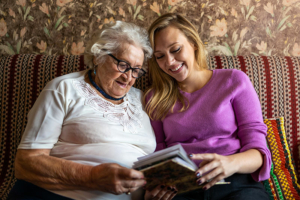How Caregivers Can Prioritize Privacy

It’s vitally important to know how caregivers can prioritize privacy to achieve a healthy life balance.
Reflect back to your teenage years. Remember how important it was to find a safe place to be on your own, to shut out the world, turn the music up, and write your most secret thoughts in your diary?
The desire for privacy that began then can become overshadowed when providing care for someone else. Yet it is still extremely important to know how caregivers can prioritize privacy, both physically and mentally, to take time for self-care.
How Can a Caregiver Prioritize Privacy?
Frankly, it isn’t always easy. You might feel as though you need to always have at least one ear and eye open to the needs of the person in your care. There are several steps you can take to help, however. Try:
- Designating a spot of privacy for both yourself and the older adult. After all, they need privacy as much as you do. Agree that whenever either of you needs some alone time, you can retreat to your chosen spot and only interrupt one another in case of an urgent situation.
- Determining house rules. In shared living spaces, put together some basic rules of etiquette that are fair for everyone. For example, take turns choosing TV shows to watch, so one person isn’t monopolizing the remote. Compromises similar to this can make together time less stressful for everyone.
- Considering emotional privacy. Make sure to take frequent breaks from care that allow you time to disconnect completely from your care role. Go on trips, attend events and activities with other friends and family members, take a book to the park for a stress-free afternoon. Responsive Home Care’s care experts are always on hand to fill your caregiving shoes when you take some time for self-care.
Special Considerations for Dementia
If the person in your care is struggling with the challenges of dementia, finding privacy becomes more challenging – and much more vital to obtain. The person may need 24/7 oversight to ensure safety, but this doesn’t mean that you should (or can) provide that level of care yourself.
We frequently hear from primary family caregivers that there is not anyone in their circle of close friends and family who knows the senior or the requirements of dementia care well enough to assist. This is when our specially trained and experienced dementia caregivers are an invaluable part of your care team. We can partner with you to ensure the seamless, reliable, skilled care a senior with dementia needs, while you take the regular breaks from care you need.
Contact us at (954) 486-6440 for further tips on how caregivers can prioritize privacy and find help in acquiring a healthier life balance. Our personalized home care services are offered in Coconut Creek, Fort Lauderdale, Pembroke Pines, and the surrounding areas.











